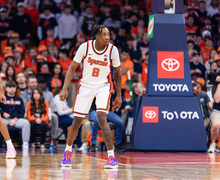Studies show tipping at restaurants may become a thing of the past
Daily Orange File Photo
Elizabeth Robinson, manager of the Bleu Monkey Cafe, said she would not enact a no tipping policy because it would ultimately hurt business. For Ton Tran, manager of Sweet Basil, tipping is socially taboo.
The restaurant industry has been wrestling with the idea of going gratuity-free in an effort to eliminate pay disparities between kitchen staff and servers — and alleviate what some call an awkward social duty.
Studies show tipping is a gratuity-free endeavor. Michael Lynn, a Cornell University Hotel School of Administration professor and tipping expert, has written more than 50 papers on the psychology behind tipping. A study conducted by Lynn at Cornell showed customers who received excellent service tipped only 1 percent more on average than those who didn’t.
“People tip out of a sense of social obligation, but they don’t want to admit that’s why they tip,” Lynn said in a July 7 interview with the Huffington Post. “(Incentivizing service is) literally a story they make up to explain their behavior.”
Lynn’s findings suggest the real motivations for tipping are discriminatory. Attractive and slender women tend to receive more generous tips, while white servers are also tipped better regardless of the customer’s race, the study found.
This social custom also faces financial opponents. Gratuities legally belong to the wait staff of a restaurant, undercutting the back-of-house and kitchen employees, according to the Huffington Post article.
Danny Meyer, a New York City restaurateur and owner of 13 successful gratuity-free establishments, found the solution in service-included checks. These bills add a charge for hospitality to the flat cost of the meal, amounting roughly to what customers would pay in total under the traditional system, according to the New York Eater website.
“We have been conditioned, after many, many years … to believe that the $25 chicken entrée is $25 … and then when we add the tip, we truly feel like it came out of a different pocket,” Meyer said in Freakonomics Radio podcast. “We’re now asking people to shift that long-held thinking and to take it out of one pocket.”
A designated hospitality fee intended to raise wages and provide stability for servers typically comes at a higher price to restaurant patrons, as it did with Meyer’s most popular restaurant The Modern.
Although The Modern did well in the first month of its reincarnation, the subject remains an unfamiliar — and risky — one to most of the public.
“I think (a no-tipping policy) would put more pressure on us as a restaurant because we wouldn’t have that extra added income to give to our employees,” said Elizabeth Robinson, manager of the Bleu Monkey Cafe. “They would be relying solely on the sales that we make for our product. So I think we’d have to raise our prices, which would in turn affect our clientele.”
For others, it’s a culturally taboo idea. Ton Tran, manager of Sweet Basil, said he’s never seen policies prohibiting tipping in Syracuse. But it’s not so unusual elsewhere. “In Asia, there’s no tipping,” he said.
The concept of tipping in restaurants has undergone years of debate and reform. Danny Meyer even penned a newsletter disavowing it in 1994, and the recent implementation of no tipping policies in eighteen of Joe’s Crab Shack locations was reduced to just four in May, according to the Nation’s Restaurant News website.
Sixty percent of customers were dissatisfied, according to the seafood chain’s research, in part because “they didn’t want to lose control of incentivizing service.”
Published on September 5, 2016 at 11:45 pm
Contact Mary: mdcatalf@syr.edu | @mrycatalfamo





